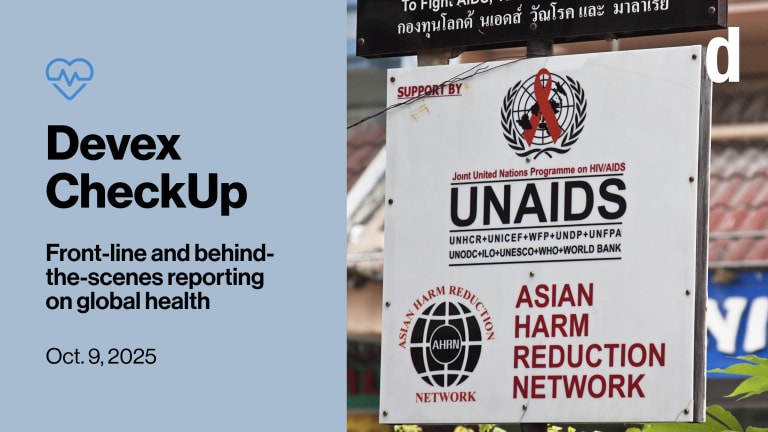
BERLIN — The United Nations AIDS agency ended 2018 in crisis. It is unclear how it will recover.
The troubles center on the contents of a report, published by an independent panel in December, documenting how the program's leaders failed to prevent or respond to allegations of sexual harassment, bullying, and abuse of power. That includes sexual assault allegations against long-time deputy director Luiz Loures, and heavy criticism of executive director Michel Sidibé for his muted handling of the situation. Loures, who denied the allegations, left without reprimand when his contract ended last year.
"It's an opportunity to come back stronger in some ways if you can begin to use this crisis as a basis for streamlining and refocusing and repopulating."
— Stephen Morrison, global health expert, Center for Strategic and International StudiesDays after the panel published its findings, Sidibé announced he would step down in June, six months earlier than expected. In a written response, he accepted “ultimate responsibility for creating the culture we want” and said he plans to use his remaining time to lead a process that will "leave a UNAIDS that is fit for purpose for the next generation."
His announcement has left the institution in a holding pattern, outside observers said, with his continued leadership undermining its credibility — particularly when it comes to its work championing women's rights — while potentially jeopardizing funding and recruitment.
"In the era of austerity … of anti-multilateralism and populist nationalism, this is no time to have a [United Nations] agency on the block with its future up in the air," Stephen Morrison, a global health expert at the Center for Strategic and International Studies think tank, told Devex.
In a best-case scenario, Morrison said this transition could offer UNAIDS an opportunity to reposition itself to meet emerging threats to the global HIV response, including mounting donor disinterest. But it has also opened the program up to questions about whether, more than two decades after its creation, it is even still necessary.
‘A real questioning of credibility’
UNAIDS is unique in the constellation of U.N. institutions. Launched in 1996 as a program to coordinate the response to HIV across various U.N. agencies, its ambitions were lofty: setting the global policy consensus and drumming up resources, while also building up country-level programs and monitoring their effectiveness.
"When UNAIDS was first created, the idea was less that it was going to be the equivalent of a U.N. agency itself, but more that its role needed to exist because the response to HIV is so much bigger than one U.N. agency," said Stefano Bertozzi, who served as the coordinator of policy, strategy, and research in the program's early years. "We needed an entity to coordinate the whole spectrum of U.N. agencies."
Bertozzi said the program was immediately hamstrung by the fact that it was not given budgetary authority over the programs it advocated for, which remained with the implementing agencies. Nevertheless, global health experts praised UNAIDS for its success in drawing attention to the epidemic and mapping the international response, guided by people who were actually living with HIV.
Sidibé, who took over from the inaugural executive director Peter Piot in 2009, has been particularly lauded for pushing governments and agencies to extend services to marginalized populations, including sex workers and men who have sex with men, and for improving UNAIDS' data collection, which has helped the program refine its agenda.
But at the same time, the independent panel found Sidibé's "personalized, patriarchal management style ... enabled a culture of harassment, including sexual harassment, bullying and abuse of power."
In positioning the allegations within a broader institutional culture that encouraged favoritism, permitted wrongdoing and enabled retaliation against those who spoke out, the report managed to rock a global health community already contending with its share of #MeToo outrages.
Among an extensive list of recommendations — including restructuring UNAIDS' human resources process and establishing new mechanisms for investigating harassment — the panel suggested a possible overhaul of UNAIDS' entire leadership team. Sweden, the second-largest contributor to the program, also promised to withhold funding until Sidibé exited.
Sidibé has noted the report's "uncomfortable truths" and offered to be held accountable for implementing a response, but it is unclear what that will look like. UNAIDS’ coordinating board has endorsed a general change agenda proposed by the program’s leadership that would prevent and respond to unacceptable behavior, and Sidibé promised to release a more detailed action plan early this year that should come ahead of an extraordinary board meeting in March, called to continue discussing the report.
"A more detailed managed action plan, complete with review mechanisms and timelines, is being developed, and will build on consultations with a wide range of stakeholders, including UNAIDS staff members," UNAIDS spokesperson Sophie Barton-Knott told Devex in an email.
But for the most part, advocates and civil society are dissatisfied with the response. In a written statement to Devex, members of the NGO delegation that sits on the program coordinating board called the management response, "weak and unfortunate. It gave the impression of being dismissive of the true nature and scale of the crisis, and of inserting ready-made answers."
Sidibé's move to hold onto his position for six more months has further muddled the situation.
"I would have resigned, full stop," Anders Nordström, Sweden's ambassador for global health, told Devex. "That is what we had expected having this report on the table." Sweden, which gave nearly $35 million to UNAIDS in 2018, will only decide on any future support once Sidibé leaves office, he said.
"It's difficult to see, in this six months, how anything serious can happen in this vacuum with the current leadership running this transition period," said Christine Stegling, executive director of the International HIV/AIDS Alliance. "What we're seeing at the moment is a real questioning of the credibility of the organization."
That has immediate implications. The Global Fund to Fight AIDS, Tuberculosis and Malaria is entering a replenishment year and UNAIDS would normally help galvanize donors, but Stegling argued that the program has "little political pulling power" at the moment. It can only begin renewing its credibility once a new leadership team is tapped, she said.
Morrison said there should not be such a rush to push Sidibé out the door, though. "Michel's concern with having an orderly transition was a very valid and important one in thinking about the survival of the institution," he said. "A wholesale exit would leave it vulnerable to being permanently wounded or raise the whole question of its survivability."
That question, though, is already festering.
A way forward?
In the wake of the report, suggestions that the program had outlived its usefulness began to circulate. The Sustainable Development Goals seem to have usurped UNAIDS' role in setting the global HIV agenda and, with no capacity to fund programs, critics said the institution is less necessary than it once was.
"Those were not helpful comments," Stegling said. "We need an agency such as UNAIDS. We can debate about whether there are fundamental changes that are needed."
Nevertheless, observers expect the comments will persist so long as Sidibé remains in office with no successor in place. "If this is going to drag along for the next six months, then I think in those six months some of the wealthier countries will start preparing the end of UNAIDS," said Gorik Ooms, a global health scholar at the London School of Hygiene and Tropical Medicine. "A new leader should be there as soon as possible to stop that."
And not just to end the speculation, but also to define a way forward for the organization — both in addressing the internal culture, but also in potentially reorienting its mission and responding to those critics unconvinced of its usefulness.
Barton-Knott confirmed that the board had met to discuss the timeline for finding Sidibé's replacement — who will ultimately be appointed by U.N. Secretary-General António Guterres — and that terms of reference for the process will eventually be made public. She wrote that a reconsideration of the mission's mandate is "not within the scope of the process of selection of the next executive director."
But observers said that doesn't prevent a new team from repositioning the program.
"It's an opportunity to come back stronger in some ways if you can begin to use this crisis as a basis for streamlining and refocusing and repopulating," Morrison said.
Stegling suggested that might take the form of maintaining its current coordinating role but broadening its scope to more demonstrably integrate linked issues, including improved health systems and the introduction of universal health care. As donor interest drifts to these topics, UNAIDS would be able to protect HIV services.
Bertozzi suggested there might be an opportunity for the program to take on an evaluative role, allowing it to identify and champion significant work being done by U.N. agencies and to fundraise off the back of those efforts. Cultivating additional donors "might radically change the way the organization worked and lead the skeptics to reconsider whether they think the organization is adding value," he said.
A new vision for the institution, in conjunction with a response that demonstrates the lessons of the independent panel have been internalized, could go a long way toward restoring UNAIDS' credibility, community insiders said.
"It's just unfortunate that right now they are on the backfoot," Stegling said. "It's a highly charged political moment which could have been avoided."








